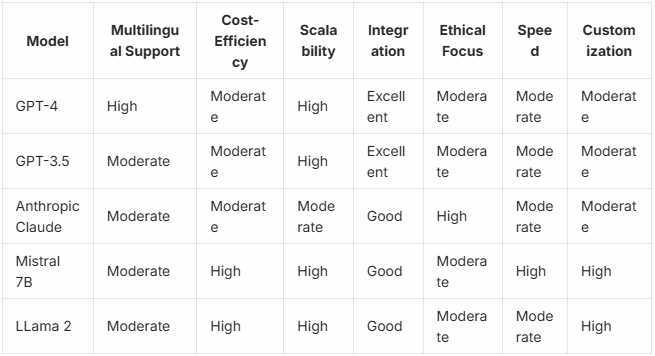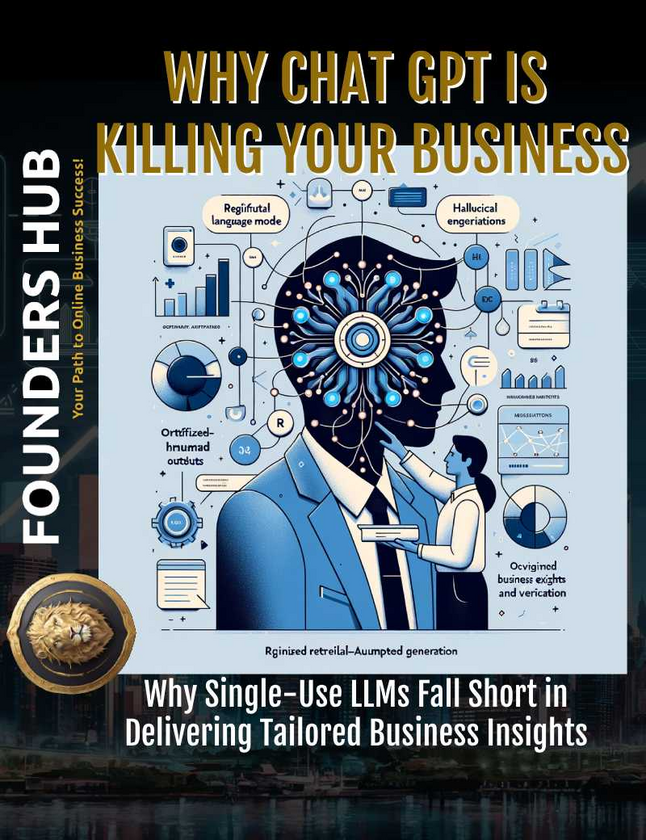🎵👉Listen To The Podcast ✅
In today's fast-paced business landscape, providing exceptional customer service is paramount for success. As technology continues to evolve, the integration of Large Language Models (LLMs) into customer service chatbots and AI agents has revolutionized the way businesses interact with their customers. These advanced language models have the capability to understand and generate human-like responses, making them invaluable tools for enhancing customer experiences.
The rise of LLMs has ushered in a new era of customer service, where AI-powered chatbots and agents can handle complex queries, provide personalized assistance, and offer seamless support across various channels. However, with the abundance of LLMs available, it can be challenging to determine which model best suits your business's specific needs.
In this comprehensive guide, we will explore the top LLMs for customer service applications, their unique capabilities, and the key considerations for successful implementation.
Key Takeaway Summary:
- OpenAI's GPT-4 and GPT-3.5 excel in reasoning, contextual understanding, and handling complex queries, making them ideal for industries requiring deep understanding and nuanced responses.
- Anthropic Claude is renowned for its focus on ethics, safety, and bias mitigation, making it a top choice for regulated industries like finance, healthcare, and legal sectors.
- Mistral 7B offers fast response times, low latency, and cost-effectiveness, making it suitable for real-time customer support applications.
- LLama 2, an open-source model, demonstrates strong performance in customer support automation and allows for extensive customization and fine-tuning.
When selecting an LLM for customer service applications, consider factors such as multilingual support, cost-efficiency, scalability, integration with existing systems, ethical considerations, and bias mitigation.
Leading LLMs for Customer Service
OpenAI GPT-4 and GPT-3.5
OpenAI's GPT-4 and GPT-3.5 are among the most advanced and widely adopted LLMs for customer service applications. These models excel in reasoning, contextual understanding, and handling complex queries, making them particularly effective for industries that require deep understanding and nuanced responses.
Capabilities:
- Excellent at reasoning and understanding context, providing human-like responses that enhance customer satisfaction.
- Handles complex and nuanced queries efficiently, making them ideal for industries such as tech support, e-commerce, and travel, where detailed and context-aware interactions are crucial.
Industry Suitability:
- Ideal for domains that require detailed and context-aware interactions, such as tech support, e-commerce, and travel.
Key Stats:
- GPT-3.5 provides high accuracy and multilingual support, enabling businesses to cater to a diverse customer base.
- GPT-4 offers even more advanced capabilities in understanding complex contexts and generating human-like responses.
Unique Selling Points:
- Enhanced user experience with more natural conversational abilities, leading to higher customer satisfaction.
- Continuous updates and improvements from OpenAI, ensuring the models stay at the forefront of language understanding and generation.
Anthropic Claude
Anthropic Claude is a unique LLM that stands out for its strong emphasis on ethics and AI safety. Designed to minimize biases and adhere to strict ethical guidelines, Claude is an excellent choice for businesses operating in regulated sectors or those prioritizing responsible AI practices.
Focus:
- Strong emphasis on ethics and AI safety, ensuring compliance with industry standards and regulations.
- Designed to minimize biases and adhere to strict ethical guidelines, promoting trust and transparency in AI interactions.
Industry Suitability:
- Perfect for regulated sectors like finance, healthcare, and legal services, where compliance with stringent regulatory requirements is crucial.
- Suitable for businesses that prioritize ethical and responsible AI practices, ensuring customer trust and confidence.
Key Benefits:
- Reliable in providing accurate and unbiased information, minimizing the risk of propagating harmful biases or misinformation.
- Helps maintain ethical standards in sensitive industries, ensuring responsible AI interactions.
Unique Selling Points:
- Commitment to ethical AI makes Claude stand out from other LLMs, addressing a critical concern in the adoption of AI technologies.
- Prioritizes user safety and trust in AI interactions, fostering long-term customer relationships and brand loyalty.
Mistral 7B
Developed by Anthropic, Mistral 7B is a powerful LLM that promises fast response times and lower latency, making it a cost-effective solution for real-time customer support scenarios.
Capabilities:
- Offers fast response times and low latency, ensuring efficient and timely customer support.
- Provides a cost-effective solution for businesses seeking to optimize their customer service operations.
Key Stats:
- Time to First Token (TTFT) is 0.33 seconds, ensuring rapid response times.
- Tokens per Second (TPS) is 112.9 tokens, enabling efficient processing of customer queries.
- Cost is $0.25 per 1M tokens, making it an affordable option for businesses of all sizes.
Use Cases:
- Ideal for high-volume customer service environments, where speed and efficiency are crucial.
- Suitable for industries requiring quick and efficient responses, such as retail and hospitality.
Unique Selling Points:
- Speed and cost-efficiency, enabling businesses to handle a large volume of customer interactions without compromising on quality or response times.
- Reliable performance in demanding customer service scenarios, ensuring consistent and satisfactory experiences for customers.
LLama 2
Developed by Meta, LLama 2 is a powerful open-source LLM that has demonstrated robust performance in automating customer support tasks. Its open-source nature allows businesses to extensively customize and fine-tune the model to align with their specific requirements and industry needs.
Capabilities:
- Shows robust performance in automating customer support tasks, handling a wide range of queries and interactions.
- Being open-source, allows for extensive customization and fine-tuning to meet business-specific requirements.
Benefits:
- Deep integration with business-specific requirements, ensuring the LLM aligns with the organization's unique needs and processes.
- Flexibility in tailoring the model to niche use cases, providing a competitive advantage through bespoke AI solutions.
Key Stats:
- Cost-effective in deployment, making it accessible to businesses of various sizes.
- Scalable solution, capable of handling multiple customer interactions simultaneously as the business grows.
Unique Selling Points:
- Open-source nature provides transparency and control, allowing businesses to understand and modify the model's behavior and outputs.
- Suitable for businesses looking for tailored AI solutions that align with their specific industry requirements and customer needs.
Implementation Considerations
When integrating LLMs into customer service chatbots and AI agents, businesses must consider several critical factors to ensure successful implementation and optimal performance.
Multilingual Support
Importance:
- Essential for global businesses to cater to a diverse customer base, ensuring seamless communication and support across different languages.
- Enhances user experience by addressing language barriers, fostering trust and customer satisfaction.
Models Offering Multilingual Support:
- GPT-4 is noted for its extensive language capabilities, supporting multiple languages and enabling businesses to provide consistent customer experiences globally.
Cost-Efficiency and Scalability
Cost-Effective Models:
- Mistral 7B and LLama 2 are highlighted for their cost-efficiency, making them accessible to businesses of various sizes and budgets.
Scalability:
- Ability to manage multiple, concurrent customer interactions without compromising on performance or response times.
- Ensures seamless scalability as the business grows, accommodating increasing customer demands.
Integration with Existing Systems
Good Integration Models:
- GPT-3.5 and GPT-4 provide seamless integration with various customer relationship management (CRM) systems, customer support platforms, and other business applications.
- Mistral 7B and LLama 2 offer flexibility in deployment, allowing for customized integrations with existing systems and processes.
Customization Options:
- LLama 2 and Mistral 7B, being open-source models, allow for extensive customization to fit specific business needs and industry requirements.
- Enables businesses to tailor the LLM's behavior, responses, and integration with existing CRMs and customer support platforms.
Ethical Considerations and Bias Mitigation
Importance:
- Ensures responsible AI utilization, building trust and confidence with customers and stakeholders.
- Critical in maintaining compliance with industry standards and regulations, particularly in sensitive sectors.
Models Focusing on Ethics:
- Anthropic Claude stands out for its ethical AI practices, prioritizing safety, transparency, and bias mitigation.
Key Aspects:
- Regular updates and improvements to minimize biases and ensure responsible AI interactions.
- Transparent AI development and deployment practices, fostering trust and accountability.
Performance and Customization
In addition to the implementation considerations, businesses must also evaluate the performance and customization capabilities of LLMs to ensure optimal customer service experiences.
Speed and Latency
Importance:
- Critical for ensuring timely and efficient customer support, directly impacting customer satisfaction and retention.
- Slow response times can lead to frustration and negative experiences, undermining the benefits of AI-powered customer service.
Low Latency Models:
- Mistral 7B excels in speed and low latency requirements, making it a suitable choice for real-time customer support scenarios.
Impact on Customer Experience:
- Faster response times lead to higher customer satisfaction, as customers receive prompt assistance and resolutions.
- Ability to handle large volumes of queries simultaneously, ensuring no customer is left waiting for an extended period.
Customization Options
Benefits:
- Allows businesses to develop AI solutions that align closely with their specific needs, processes, and industry requirements.
- Provides a competitive advantage by offering tailored and personalized customer experiences.
Open-Source Models:
- LLama 2 and Mistral 7B offer significant customization capabilities, enabling businesses to modify the model's behavior, outputs, and integration with existing systems.
- Flexibility in fine-tuning the models on domain-specific data, ensuring accurate and relevant responses for the target audience.

This table provides a quick overview of how the top LLMs for customer service compare across various key factors, including multilingual support, cost-efficiency, scalability, integration with existing systems, ethical focus, speed, and customization options.
Conclusion
In the ever-evolving landscape of customer service, the integration of Large Language Models (LLMs) into chatbots and AI agents has become a game-changer. From OpenAI's GPT-4 and GPT-3.5, renowned for their reasoning and contextual understanding capabilities, to Anthropic Claude's focus on ethics and safety, and the cost-effective and customizable solutions offered by Mistral 7B and LLama 2, businesses have a wide range of options to choose from.
When selecting the best LLM for your customer service needs, it's crucial to consider factors such as multilingual support, cost-efficiency, scalability, integration with existing systems, ethical considerations, and bias mitigation. Additionally, evaluating performance metrics like speed, latency, and customization options can help ensure optimal customer experiences.
Ultimately, the effectiveness of an LLM in customer service applications often depends on how it's implemented, fine-tuned, and integrated with other systems. Many businesses are finding success by combining multiple models or leveraging specialized platforms that leverage these LLMs for optimal performance in customer service scenarios.
As the adoption of AI in customer service continues to grow, businesses that prioritize ethical and responsible practices, while delivering personalized and efficient support, will undoubtedly gain a competitive edge. By staying informed about the latest developments in LLMs and their applications, organizations can future-proof their customer service strategies and provide exceptional experiences that foster long-lasting customer relationships and brand loyalty.
Need more asstance building chatbot and customer service agents for your business?
Reach out to us today!



















